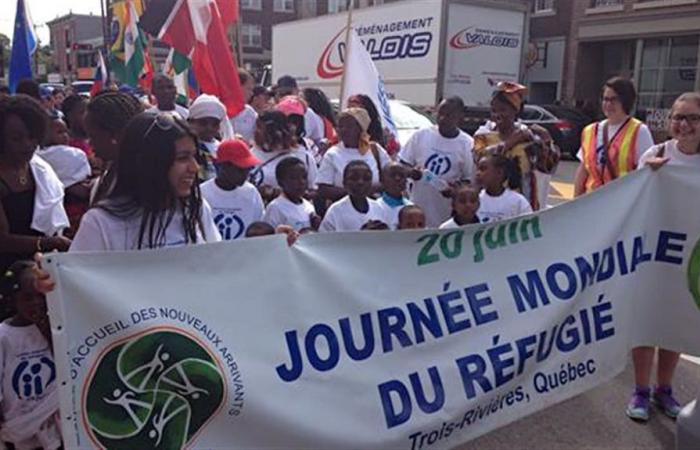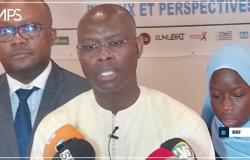Following the celebration of International Refugee Day on June 20. Organizations such as Action for Human Rights and Friendship (ADHA), Movement for Ethics and Transparency (MET) and International Movement of Apostolate of Independent Milieus (MIAMSI SENEGAL) released a string of recommendations this Friday June 21 to challenge the authorities and public opinion in Senegal and internationally on the situation of refugees and asylum seekers in Senegal and the need to find solutions.
“According to the United Nations High Commissioner for Refugees (UNHCR), 117.3 million people have been forcibly displaced around the world by the end of 2023, due to persecution, conflict, violence or human rights violations. human rights. Among them, 75.9 million are internally displaced. Additionally, current projections estimate that the number of people displaced by climate change could reach between 100 million and 1 billion by 2050,” the statement said.
The document reveals that “in 2023, Senegal welcomed nearly 15,000 refugees and more than a thousand asylum seekers of various nationalities, attracted by the country’s relative political stability. Despite the efforts of the Senegalese authorities, asylum seekers face difficulties, particularly with regard to the procedure for determining refugee status and the recognition of documents by certain private institutions.
Recalling, “that any person is considered a refugee who has a well-founded fear of being persecuted because of his race, his religion, his nationality, his membership in a social group or his political opinions, is outside the country of which he or she is a national and who cannot or does not want to claim the protection of this country (Geneva Convention of 1951 and its Additional Protocol of 1967). Senegal, signatory to this convention as well as that of the 1969 AU Convention, created the National Commission for Eligibility for Refugee Status by Decree No. 68-27 of July 24, 1968, amended by Law No. 75-109 of December 20, 1975.”
According to these organizations, “the Senegalese asylum system presents major shortcomings, particularly with regard to the procedure for determining refugee status. Administrative and procedural gaps prevent those in need of protection from fully benefiting from it. The National Eligibility Commission is often very slow, forcing some asylum seekers to wait almost three years for a decision, thus worsening their situation.”
Thus, ADHA, MET and MIAMSI-SENEGAL welcome the efforts already made by the Senegalese authorities, but recognize that challenges remain. As such, legislation setting a deadline for processing asylum applications would be crucial. Currently, the rate of granting refugee status is very low and asylum seekers often do not have access to humanitarian aid until their status is recognized. Additionally, Senegal does not have reception centers for the most vulnerable asylum seekers, such as pregnant women, unaccompanied children and the elderly.
In addition, the Senegalese asylum system, the organizations point out, “does not provide for a second-level instance allowing refugees who wish to do so to appeal. The members of the Commission study asylum applications at first instance and appeals, leaving asylum seekers without assistance during the entire waiting period.
“To better care for refugees, some countries have implemented concrete measures. For example, Togo created an appeals commission in 2016, thus offering a second chance to asylum seekers in the event of rejection at first instance.
Many refugees face difficulties obtaining a refugee identity card and travel document. Documents that are not often recognized by certain public and private establishments. Legislation clarifying the procedures for obtaining these documents would be an important first step, accompanied by awareness campaigns so that all relevant officials recognize these documents.
Another pitfall is the negative socio-economic impact of the pandemic and the preventive measures imposed in the region which have started to generate social unrest. In Senegal, thousands of young people left the country to escape imprisonment during political repression. Some took makeshift canoes, risking their lives at sea, like the famous political detainee Papito KARA who eventually died. The specific protection risks and challenges for forcibly displaced populations are therefore very present.
Refugees and displaced people often live in overcrowded and precarious conditions. It is important to remember that refugees do not leave their countries by choice, but by force, fleeing war, persecution, discrimination and human rights violations. They therefore need effective protection from their host country.
So. ADHA, MET and MIAMSI-SENEGAL strongly encourage the Senegalese government to review its national legislation to address the weaknesses of its asylum system. They also recommend the ratification of the African Union Convention for the Protection and Assistance of Displaced Persons in Africa (Kampala Convention) to better care for internally displaced persons in Casamance.
Finally, ADHA, MET and MIAMSI-SENEGAL suggest adopting the Ugandan model, which facilitates the reception, protection and integration of refugees by allocating land to each refugee family for the construction of shelters and for cultivation. .
Finally, ADHA, MET and MIAMSI-SENEGAL encourage citizens to continue the fight against land dispossession in Senegal and for the preservation of the coastline. By authorizing private construction for a privileged minority and destroying the coastline, the authorities had contributed to accelerating the phenomena of climate migration and internal displacement,” the document reads.






